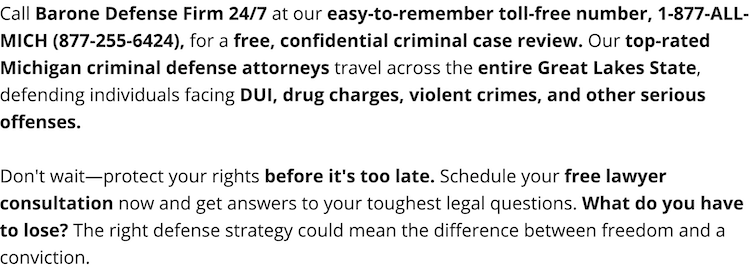Person’s Rights in a Gun Investigation
A person's rights in a Michigan gun investigation depends on what stage of the gun investigation the police are in. The police can always ask an individual to give consent to allow the search. If at any time in the investigation the police ask an individual if they can search the car and the individual says yes, the police have full authority to search the vehicle. Consenting to a search waives the protections of the fourth amendment. Before an individual is arrested, the police must have a warrant, get consent, or see a weapon in plain view to search a person's vehicle.
The police can do a Terry search or a Terry frisk if they believe there is enough evidence based on what they are able to observe that they are seeing what might be a gun, for example, a bulge in an individual's waistband, a bulge their pocket, or around their ankle, in places where a gun might normally be possessed. If something on the individual's body appears to be in the shape and size of a gun, the police may be able to search an individual for the safety of the police officer.
As is always true, if the police officer asks an individual if they can pat them down and the person says yes, that is a consequential search. Any search conducted by police depends on the circumstances and the stage of the officer's investigation.
If you are under investigation for a gun-related offense, it is vital to contact a Michigan gun defense attorney right away to ensure that your rights are protected throughout the investigation up to, and including the arrest, if an arrest occurs.
After the Arrest
Following an arrest, a person's rights in a Michigan gun investigation have changed. Once an individual is arrested, the police are permitted to do an inventory, or impound, search to determine what is present in the vehicle before it is taken into the police possession. Once an individual is arrested, their right to deter or preclude a search of any kind is much less than before they were arrested.
Once an individual is arrested, there are other exceptions to the Fourth Amendment requirement for a search warrant. In some instances, they can search an individual's person as part of the search incident to arrest and that may extend to the vehicle. There is recent case law in Michigan that somewhat limits the police officer's ability to search someone's vehicle when they are arrested for a traffic crime. However, in most instances, subsequent to the arrest, the police can lawfully search someone's car.
On the other hand, they can inspect a person following an arrest to see whether or not they have a firearm. This is a search incident to arrest and is done primarily for police officers' safety. In that instance, they can check an individual's pockets. The officer does not need any type of pre-determination that someone may have a gun, they simply have the right to search that individual.
 Barone Defense Firm Home
Barone Defense Firm Home
















